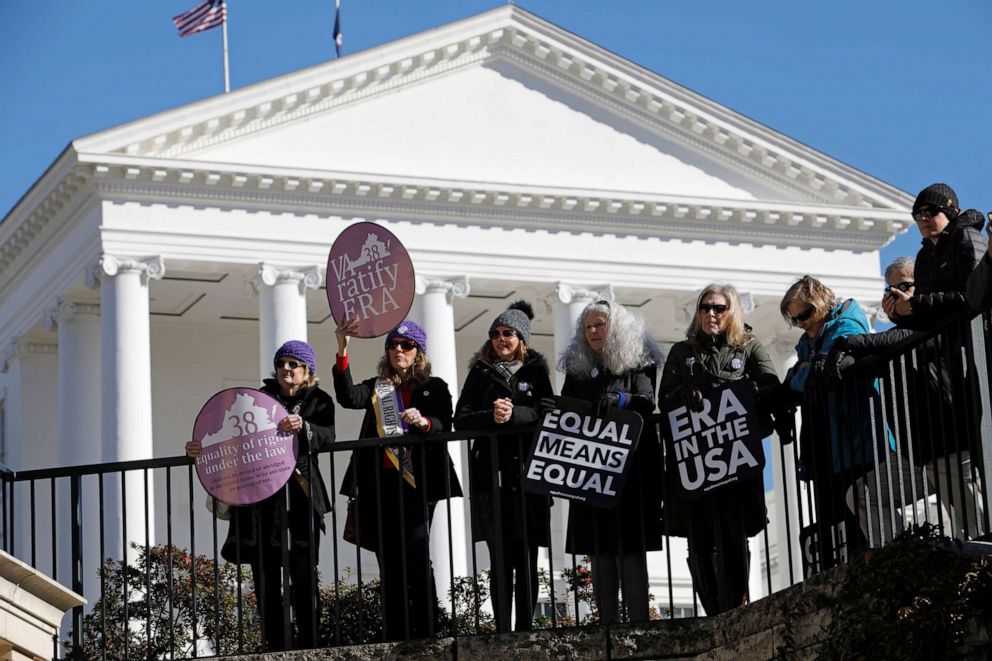House passes resolution that would dissolve Equal Rights Amendment deadline
The 10-year deadline issued in 1973 created legal controversy over ERA adoption.
The U.S. House of Representatives voted Thursday on a resolution that would clear the path for a new Constitutional amendment to codify equal rights for women.
H.J. Resolution 79, which would remove the 1982 deadline imposed on Congress for the states to ratify the Equal Rights Amendment, passed with a vote of 232 to 183. Republicans voted against the resolution, with the exception of five GOP House members.
"Equality of rights under the law shall not be denied or abridged by the United States or by any State on account of sex," the amendment states. Supporters, like Rep. Jackie Speier, H.J. Resolution 79's main sponsor, have argued that the U.S. Constitution does not mandate deadlines on amendments, and since it passed its 38-state minimum for ratification last month, it should be incorporated into the Constitution.
“There is no expiration date on equality,” Speier said at the news conference Wednesday.

Thursday's vote was the latest in the nearly century-long battle to ratify the ERA. The amendment has been in the works in Congress since the 1920s and picked up steam during the civil rights era.
When Congress sent the amendment to the states for ratification in 1972, a seven-year deadline was imposed. It extended the deadline by three years, but by 1982, only 35 states had ratified it.
Activists pushed for the amendment’s adoption following the passage of the 27th amendment, which took 200 years to get over the threshold. In 2017, Nevada ratified the ERA, followed by Illinois in 2018 and Virginia in January.
The National Archives and Records Administration said it would abide by the January opinion issued by the U.S. Department of Justice's Office of the Legal Counsel (OLC) that said the amendment couldn’t be ratified due to the missed deadline. The attorneys general of Virginia, Illinois and Nevada filed a lawsuit against the National Archivist that orders it to ratify the amendment.
Proponents argued that Article V of the U.S. Constitution has no time limit for amendment ratification and the ERA is needed to guarantee that women are not discriminated throughout the country.
"There is no constitutional prohibition for passing this," Rep. Sheila Jackson Lee, D-Texas, said on the House floor.
Opponents, however, contended that the deadline was already set in stone, noting that five state houses had revoked their ratification.
"Congress cannot go back and remove a deadline on a constitutional amendment deadline. Pretending we can remove the time limits of passage is futile and deceptive," Rep. Vicky Hartzler, R-Miss., said.

House Speaker Nancy Pelosi stressed that despite the progress made in the courts and new state laws, women still face discrimination including wage gaps and weak protections against sexual harassment.
"Millions of American women still face inequality in the law," she said.
Rep. James Sensenbrenner, R-Wis., contended the ERA would lead to changes that would hurt women in the long run. He cited several examples including auto and health insurance rates, which are currently lower for women.
"If the ERA was ratified into the Constitution, girls would have to pay boy’s rates of auto insurance," the congressman argued.
The proposal's passage in the Senate is unclear. Senate Majority Leader Mitch McConnell told reporters last week that he was "personally not a supporter" of the ERA.
The ERA Coalition, which is made up of several women's rights advocacy groups, urged McConnell to approve the resolution.
"Our polling shows that 94% of Americans want the Equal Rights Amendment to be part of the Constitution. In 2020, women should no longer be second-class citizens in the United States of America," it said in a statement.




